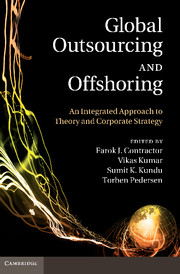Book contents
- Frontmatter
- Contents
- List of figures
- List of tables
- List of boxes
- Notes on contributors
- Preface: the reconfiguration of the world economy
- Part I Conceptual frameworks and theories
- Part II The offshoring and outsourcing of R&D and innovative activities
- 4 Blurring firm R&D boundaries
- 5 Outsourcing, fragmentation, and integration
- 6 Towards a better understanding of multinational enterprises' R&D location choices
- 7 Does R&D offshoring displace or strengthen knowledge production at home? Evidence from OECD countries
- 8 Innovation across tech-firms' boundaries
- 9 Suitable organization forms for knowledge management at various R&D functions in decentralized and cooperative R&D networks
- Part III Management issues in offshoring and virtual teamwork
- Part IV Empirical analyses and case studies of outsourcing and offshoring
- Index
- References
9 - Suitable organization forms for knowledge management at various R&D functions in decentralized and cooperative R&D networks
Published online by Cambridge University Press: 10 January 2011
- Frontmatter
- Contents
- List of figures
- List of tables
- List of boxes
- Notes on contributors
- Preface: the reconfiguration of the world economy
- Part I Conceptual frameworks and theories
- Part II The offshoring and outsourcing of R&D and innovative activities
- 4 Blurring firm R&D boundaries
- 5 Outsourcing, fragmentation, and integration
- 6 Towards a better understanding of multinational enterprises' R&D location choices
- 7 Does R&D offshoring displace or strengthen knowledge production at home? Evidence from OECD countries
- 8 Innovation across tech-firms' boundaries
- 9 Suitable organization forms for knowledge management at various R&D functions in decentralized and cooperative R&D networks
- Part III Management issues in offshoring and virtual teamwork
- Part IV Empirical analyses and case studies of outsourcing and offshoring
- Index
- References
Summary
Introduction
Companies engaged in Research and Development (R&D) in highly competitive global industries have to take into consideration numerous factors such as reduced delivery time, cost reduction, and increased demands for differentiated products with higher quality (Balbontin et al., 2000). Management issues, such as supply-chain management, alliance strategies, and outsourcing strategies, have been introduced to solve the aforementioned problems, and have become primary methods used by many companies (Boyle et al., 2006; Li et al., 2005). Stiff competition has forced companies to consider the relocation of R&D activities to foreign locations (“offshoring”) and/or to external service providers (“outsourcing”) in networks to develop new strategies, capacities, and capabilities. By tapping into external networks, the companies can make use of focused expertise and concentrated resources. They can also take advantage of diversified cutting-edge technologies by sharing risks and benefits with the participants inside the networks. The trend of R&D management structure is changing from being ethnocentric centralized to geocentric centralized, and then to polycentric decentralized. The current R&D management structure tends to be decentralized and cooperative. The primary manufacturing operation has become the mass customization system in industry. All of these are to meet the urgent demands for carrying out R&D in decentralized and cooperative R&D networks.
Even though carrying out cooperative R&D is important, only very few researchers have examined R&D in decentralized and cooperative R&D networks (Andersson et al., 2002; Belderbos et al., 2004; Helble and Li, 2004).
Information
- Type
- Chapter
- Information
- Global Outsourcing and OffshoringAn Integrated Approach to Theory and Corporate Strategy, pp. 239 - 264Publisher: Cambridge University PressPrint publication year: 2010
